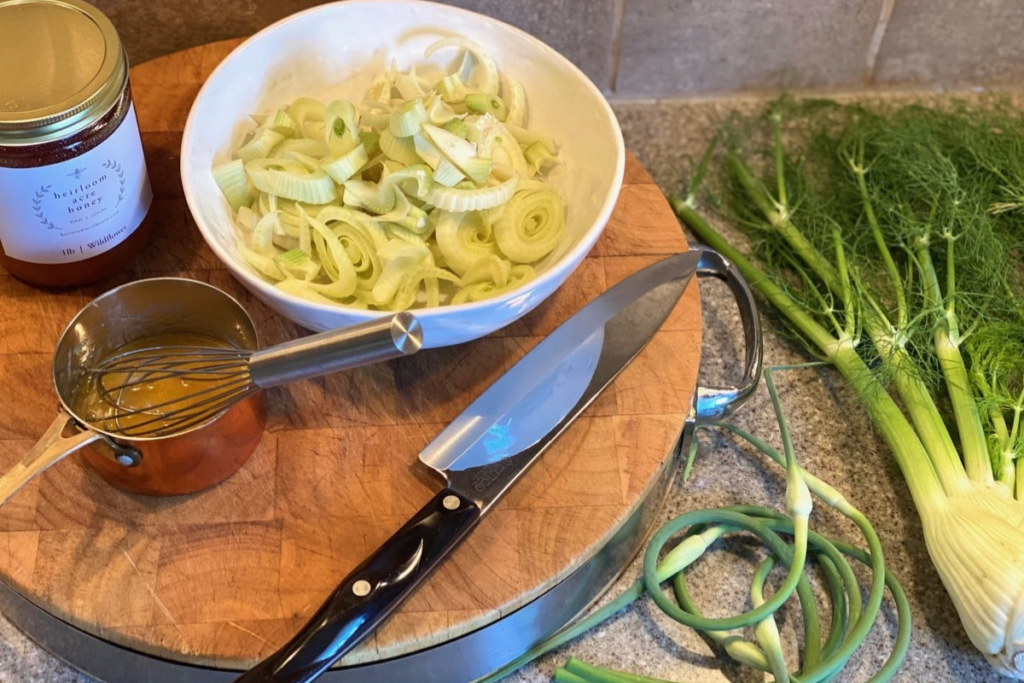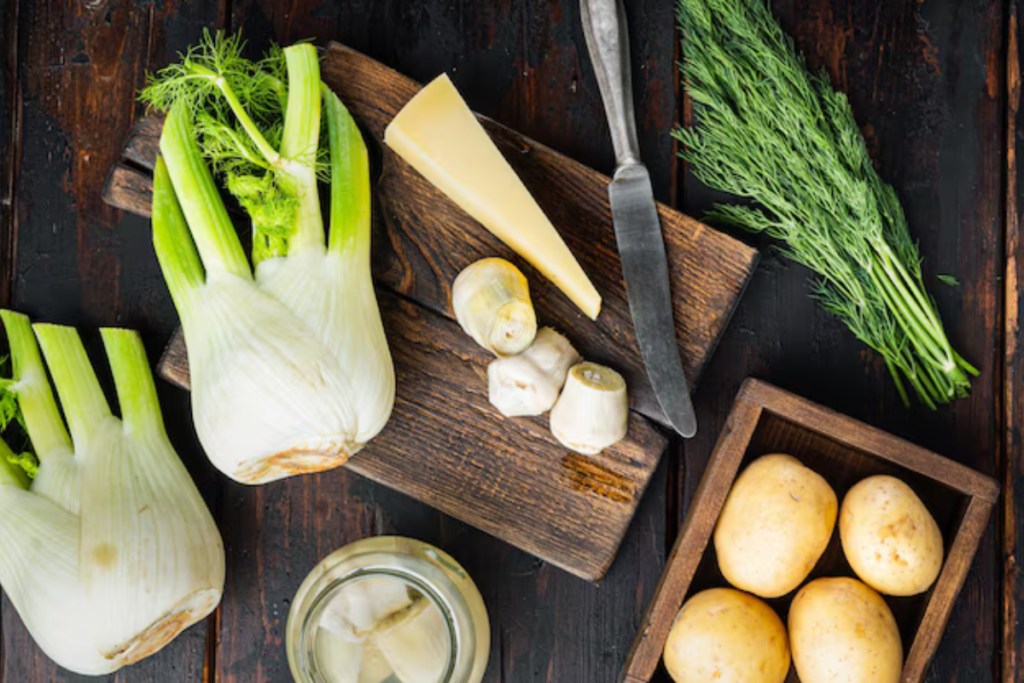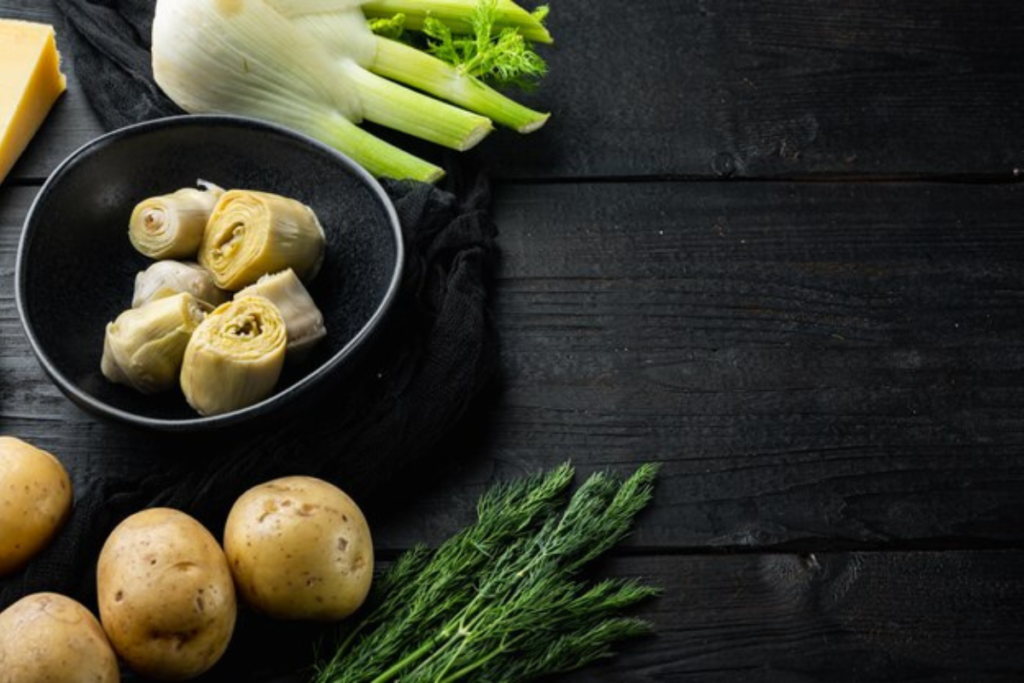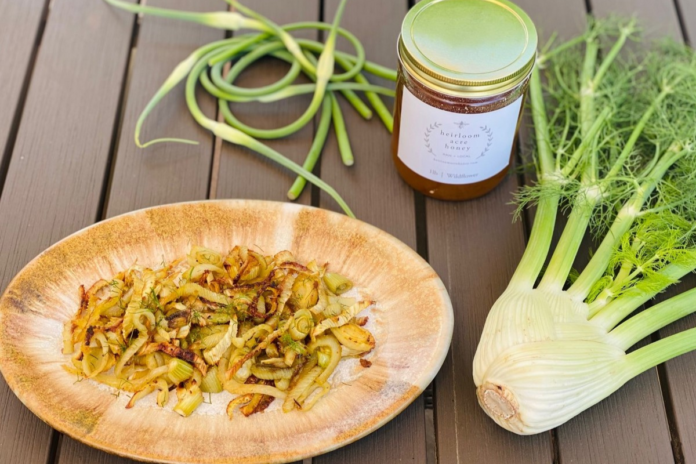Italy is famous for its delicious cuisine, bursting with flavors and aromas. But Italian food is not just about indulgence, it also has a strong focus on using ingredients that promote good health and digestion.
Fennel, garlic, and olive oil are some of the key ingredients used in traditional Italian dishes that have been known to aid in digestive health. In this article, we will explore the benefits of these ingredients and how they can be incorporated into your diet for improved gut health.
From traditional recipes to modern adaptations, we will delve into the world of Italian cooking and discover how these simple yet powerful ingredients can work wonders for your digestive system.
What Is Fennel?
Fennel is a flowering plant that belongs to the carrot family and is native to the Mediterranean region. It has a crisp texture and a refreshing anise-like flavor, making it a popular ingredient in Italian cooking. Fennel, garlic, and olive oil are Italian ingredients for digestive health that have been used for centuries.
Apart from adding depth of flavor, fennel has been used for its medicinal properties in ancient civilizations like Greece and Egypt. It is rich in fiber, antioxidants, and essential vitamins and minerals which make it beneficial for digestive health.
Also known as “finocchio” in Italian, fennel is commonly used in salads, soups, and stews. It can also be roasted or grilled as a side dish or added to pasta dishes for a burst of flavor and health benefits.
What Is Garlic?
Garlic is a staple ingredient in Italian cuisine and has been used for its medicinal properties since ancient times. Known for its pungent flavor and strong aroma, garlic contains sulfur compounds that have anti-inflammatory and antioxidant effects on the body.
Studies have shown that regular consumption of garlic can lower the risk of digestive disorders such as gastritis, peptic ulcers, and inflammatory bowel disease. It also promotes the growth of good bacteria in the gut, which aids in digestion and strengthens the immune system.
In Italian cooking, garlic is used in various forms – raw, roasted, minced or crushed – to add depth of flavor to dishes like pasta sauces, soups, and stews. Its health benefits make it a must-have ingredient in your kitchen.
What Is Olive Oil?
Olive oil is a staple in the Mediterranean diet and has been used for its therapeutic properties since ancient times. It is rich in monounsaturated fatty acids, which help in reducing inflammation and improving overall gut health.
Apart from its anti-inflammatory properties, olive oil also contains polyphenols that act as antioxidants and can improve digestion by promoting the growth of beneficial gut bacteria. It is widely used as a cooking oil, dressing for salads or dips like pesto, and even as a natural remedy for constipation.
When buying olive oil, opt for extra virgin or cold-pressed varieties to get the most health benefits. It may be pricier, but the quality and taste are worth it.
Top Benefits Of Fennel, Garlic, And Olive Oil For Digestive Health

There is a reason why these three ingredients are commonly found in traditional Italian dishes – they not only enhance the flavor of food, but also provide numerous health benefits. Some of the top benefits include:
Improved Digestion
Fennel, garlic, and olive oil are exceptional allies for promoting digestion in the body due to their intrinsic natural properties. Fennel, with its high fiber content, aids in breaking down food more effectively while preventing constipation.
The soothing anise-like effects of fennel also relieve digestive discomfort, making it a powerful remedy for heartburn and upset stomachs. Garlic contributes to improved digestion by stimulating the production of gastric juices and enzymes, enhancing nutrient absorption.
Meanwhile, olive oil serves as a gentle lubricant for the digestive tract, encouraging the smooth passage of food and reducing the risk of digestive complications. Incorporating these ingredients regularly in your diet can lead to a more efficient, healthy digestive process, ensuring overall wellness.
Relief from Gas and Bloating
Gas and bloating are common digestive issues that can cause discomfort and pain. Fennel, garlic, and olive oil have all been known to provide relief from these symptoms by reducing inflammation in the gut and aiding in digestion.
Fennel contains anethole, a compound that helps relax the muscles of the intestines, reducing gas buildup. Garlic has anti-spasmodic properties that prevent cramping and bloating, while olive oil lubricates the intestines for easier passage of gas.
Plus, incorporating these ingredients into your meals can also help prevent excessive gas and bloating in the first place.
Prevention of Digestive Disorders
The rich nutritional profile of fennel, garlic, and olive oil make them powerful allies in preventing digestive disorders. The fiber and antioxidants in fennel can reduce the risk of developing conditions like constipation, diverticulitis, and colon cancer.
Garlic’s anti-inflammatory properties can protect against gastritis and ulcers, while olive oil’s monounsaturated fats have been linked to a lower risk of developing Crohn’s disease.
By regularly including these ingredients in your diet, you can maintain a healthy gut and reduce the chances of developing digestive disorders.
Boosted Immunity
The gut is home to a large portion of our immune system, and having a healthy gut is essential for overall immunity. Fennel, garlic, and olive oil all have antibacterial and antiviral properties that can help fight off infections and boost the body’s defenses.
Garlic contains allicin, a compound with antibacterial properties that has been shown to be effective against common pathogens like E.coli and H.pylori. Olive oil’s antioxidants also play a role in boosting immunity by reducing inflammation and oxidative stress in the body.
Incorporating these ingredients into your meals can keep your immune system strong and protect you from getting sick.
Anti-inflammatory Effects
Inflammation is a common cause of digestive issues, and fennel, garlic, and olive oil all have anti-inflammatory properties that can help alleviate symptoms like bloating, cramping, and discomfort.
Fennel contains compounds like anethole and quercetin that have been shown to reduce inflammation in the body. Garlic’s sulfur compounds also have anti-inflammatory effects on the gut lining.
Meanwhile, olive oil’s high levels of oleic acid have been linked to a decreased risk of inflammatory bowel disease.
Including these ingredients in your diet can play a significant role in reducing chronic inflammation and promoting overall gut health.
Antioxidant Properties
Oxidative stress has been linked to numerous health issues, including digestive disorders. Fennel, garlic, and olive oil are all rich in antioxidants that can help fight off free radicals and protect against oxidative damage.
Fennel contains various phenolic compounds like rosmarinic acid and quercetin that have potent antioxidant effects. The sulfur compounds in garlic also act as antioxidants, protecting the body from cellular damage.
Meanwhile, olive oil’s polyphenols have been shown to reduce oxidative stress and improve overall gut health.
Regularly consuming these ingredients can provide a significant boost of antioxidants for your body.
Promotes Healthy Gut Bacteria
The balance of gut bacteria is crucial for maintaining digestive health, and fennel, garlic, and olive oil can all contribute to a healthy gut microbiome.
Fennel contains prebiotics – non-digestible fibers that promote the growth of beneficial bacteria in the gut. Garlic also has prebiotic effects and has been shown to increase levels of good bacteria like Lactobacillus and Bifidobacterium.
Olive oil’s polyphenols have also been found to support the growth of beneficial bacteria while reducing harmful bacteria in the gut.
By including these ingredients in your diet, you can maintain a healthy balance of gut bacteria for optimal digestion and overall wellness.
These are just some of the many benefits that fennel, garlic, and olive oil provide for digestive health. Incorporating these ingredients into your meals can have a significant impact on maintaining a healthy gut and preventing digestive issues.
Incorporating These Ingredients Into Your Diet

Now that we know the benefits of fennel, garlic, and olive oil for digestive health, let’s explore how we can incorporate them into our daily diet. Some simple ways to do so are:
- Adding chopped fennel to salads or roasting it as a side dish: Fennel adds a refreshing crunch and subtle licorice flavor to dishes, making it a versatile ingredient to incorporate into various meals.
- Using garlic in cooking: Garlic is a staple in many cuisines and can be added to soups, sauces, stir-fries, and more for its distinct flavor and health benefits.
- Drizzling olive oil on salads or using it for sautéing vegetables: Olive oil’s mild taste makes it suitable for both savory and sweet dishes, making it easy to add to your everyday meals.
- Making a fennel, garlic, and olive oil tea: Steeping chopped fennel and garlic in hot water with a splash of olive oil can create a soothing herbal tea that aids digestion.
- Incorporating these ingredients in dips and spreads: Fennel can be blended with other herbs and garlic to create a flavorful dip, while olive oil can be used as a base for homemade salad dressings or hummus.
With a little creativity, you can easily add fennel, garlic, and olive oil to your meals and reap the numerous benefits they provide for digestive health. So next time you’re planning your menu, consider incorporating these ingredients and taking care of your gut health in the process!
Is Every Form of Fennel, Garlic, and Olive Oil Beneficial for Digestive Health?
It’s essential to note that not all forms of fennel, garlic, and olive oil are created equal. For optimal health benefits, it’s best to consume these ingredients in their raw or minimally processed form.
While cooked fennel still retains some nutrients, overcooking can break down its fiber content. Similarly, heating garlic at high temperatures may reduce the amount of allicin present.
When it comes to olive oil, extra virgin olive oil is the least processed and contains higher levels of antioxidants and anti-inflammatory compounds compared to other types of olive oil.
So while incorporating these ingredients into your diet, try to consume them raw or minimally processed for maximum health benefits. Also, remember to consult a healthcare professional if you have any underlying health conditions or are taking certain medications, as these ingredients may interact with them.
What Are the Benefits of Raw Garlic for Gut Health?
While cooked garlic still provides many health benefits, raw garlic is believed to have even more significant effects on gut health. Raw garlic contains an enzyme known as alliinase that converts alliin (a sulfur-containing compound) into allicin (a potent antioxidant and anti-inflammatory compound). Allicin is also responsible for giving garlic its distinctive odor and taste.
Studies have shown that consuming raw garlic can improve the balance of gut bacteria, decrease inflammation in the gut lining, and reduce symptoms of digestive disorders like irritable bowel syndrome (IBS).
Additionally, raw garlic has been found to have broad-spectrum antimicrobial properties, meaning it can fight off harmful bacteria in the gut while promoting the growth of beneficial bacteria.
Are There Any Risks Associated with Overconsumption?

While fennel, garlic, and olive oil provide numerous benefits for digestive health, it’s essential to consume them in moderation. Overconsumption of these ingredients may lead to unwanted side effects like bloating, gas, and diarrhea.
If you’re new to incorporating these ingredients into your diet, start with small amounts and gradually increase as tolerated. It’s also crucial to listen to your body and stop consuming them if you experience any discomfort.
Always remember that a balanced diet consisting of a variety of whole foods is key to maintaining optimal gut health. So while fennel, garlic, and olive oil are beneficial additions to your meals, they should not be relied upon as the sole source of nutrition.
FAQs
How do fennel seeds and lemon juice aid in digestive health?
Fennel seeds are known for their ability to soothe the digestive tract and reduce bloating. When combined with lemon juice, they can enhance digestion and provide a refreshing, natural remedy for digestive discomfort. Incorporating these into your diet supports overall digestive health.
What are the benefits of garlic consumption and garlic preparations for digestion?
Garlic consumption, whether through fresh garlic, garlic cloves, or garlic powder, supports digestive health by promoting the production of digestive enzymes. Different garlic preparations can offer a variety of benefits, including reducing inflammation and potentially inhibiting cancer cell proliferation due to the presence of compounds in allium vegetables.
How can cooking fennel with olive oil polyphenols improve digestive health?
When you cook fennel with olive oil polyphenols, it not only enhances the sweeter flavor of this root vegetable but also boosts its digestive benefits. The polyphenols in olive oil are known to support gut health and reduce inflammation, making this a powerful combination for maintaining a healthy digestive system.
Is garlic better when eaten raw or cooked for digestive benefits?
Garlic can be beneficial for digestion when eaten raw or cooked, though garlic intake in its raw form retains more allicin, which has significant health benefits. However, some people may find raw garlic burns their digestive tract, so gently cooking a garlic clove or using garlic powder can be a milder option while still supporting digestion and overall wellness.
Conclusion
In conclusion, fennel, garlic, and olive oil are three nutrient-dense ingredients that offer numerous benefits for digestive health. They contain prebiotics, polyphenols, and other compounds that promote the growth of beneficial bacteria while reducing harmful bacteria in the gut.
By incorporating these ingredients into our daily diets in their raw or minimally processed forms, we can maintain a healthy balance of gut bacteria and prevent digestive issues.
However, it’s essential to consume them in moderation and consult a healthcare professional if you have any underlying health conditions or concerns. Remember to listen to your body and make sure to have a balanced diet consisting of various whole foods for optimal digestive health.




